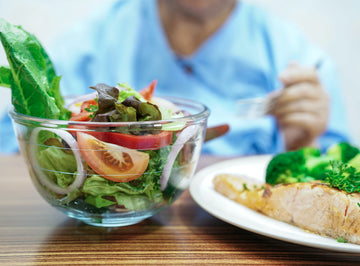
Good nutrition is essential for everyone to lead a healthy, disease-free life. Good nutrition refers to a balanced diet with all required micro and macro nutrients in proper amounts.
Taking care of the nutritional requirements is crucial for people who are suffering from or at risk of developing bedsores. They may need extra proteins, vitamins and minerals, and calories to help their wounds heal.
A deficiency in these vital nutrients may result in delayed wound healing and further complications such as infections. Malnourishment may result in weight loss and compromised immunity in the bedridden. In fact, malnourishment is proven to be associated with the development of pressure ulcers in long-term bedridden patients. This is a direct result of weight loss, poor visceral protein, and low body-mass index.
Here are the primary nutritional factors to consider when addressing skin health in bedridden individuals:
-
Micronutrients and Macronutrients
First and foremost, bedridden individuals require a balanced diet that provides all the necessary micronutrients (vitamins and minerals) and macronutrients (proteins, fats, and carbohydrates) in appropriate amounts. Caloric intake must meet their specific requirements to avoid depletion of protein and fat stores, which can be detrimental to their overall health.
Monitoring blood sugar levels is also crucial for these patients since hyperglycemia (high blood sugar) can impede wound healing, increase infection rates, and even lead to sepsis.

-
The Role of Proteins
Protein intake is paramount for individuals dealing with bedsores. Proteins provide essential amino acids, including arginine, which is well-known for its wound-healing properties. These patients often require double the normal protein intake to support the healing process effectively.
Hypoalbuminemia, characterized by low serum albumin levels, is closely associated with the development of bedsores. Adequate albumin levels are vital for wound healing and overall skin health. Good protein sources include milk, eggs, pulses, and lean meats.
-
Iron for Oxygenation
Iron plays a critical role in maintaining healthy skin. Anemia, characterized by low hemoglobin levels, can increase the incidence of bedsores and impede wound healing. Hemoglobin carries oxygen to body tissues, and a deficiency can lead to reduced tissue oxygenation.
Iron-rich foods such as leafy greens, beets, red lean meats, lentils, and cereals should be incorporated into the diet to support proper oxygenation and overall skin health.
-
The Significance of Zinc
Zinc is another essential mineral that plays a crucial role in immunity and wound healing. A deficiency in zinc can adversely affect cell regeneration and epithelialization, the process of covering wounds.
Incorporate zinc-rich foods into the diet, including seafood, meat, milk, eggs, wheat germ, and whole wheat, to support these vital processes.
-
The Vitality of Vitamins
Vitamins are instrumental in maintaining healthy skin and supporting the wound-healing process. Vitamin C, for example, enhances iron absorption, a critical factor in maintaining skin health. Since the body cannot store large amounts of vitamin C, monitoring patients for deficiency is essential.
Citrus fruits and green vegetables are excellent sources of vitamin C and should be included in their diet.
Vitamin B also plays a pivotal role in skin health and can be found in cereals, whole wheat, and other fortified foods.

Additional Care Tips:
Beyond addressing specific nutrient needs, several other critical aspects should be considered when caring for bedridden individuals:
- Regular Weight Monitoring: Consistently monitor the weight of bedridden patients and adjust their nutritional requirements accordingly. Weight loss can be indicative of malnourishment, which must be promptly addressed.
- Tailored Meal Plans: Create a well-balanced meal plan that provides sufficient calories and nutrients to meet individual needs. Supplementation may be necessary to bridge any nutritional gaps.
- Dietary Records and Assessments: Maintain detailed records of the patient's diet and conduct periodic nutritional assessments to ensure that their dietary needs are met effectively.
- Enteral Feeding: In cases where oral feeding is compromised, enteral feeding (nutrient delivery directly into the stomach or intestines) should be administered with careful attention to patient comfort and nutritional adequacy.
While bedridden individuals often grapple with a multitude of physical challenges, addressing their nutritional requirements and preventing malnourishment can significantly alleviate their struggles. A well-balanced diet rich in essential nutrients, along with careful monitoring and tailored care plans, can contribute to improved skin health and enhanced overall well-being for those confined to extended periods of immobility. By prioritizing nutrition, we can help bedridden individuals regain their vitality and enjoy a better quality of life.



